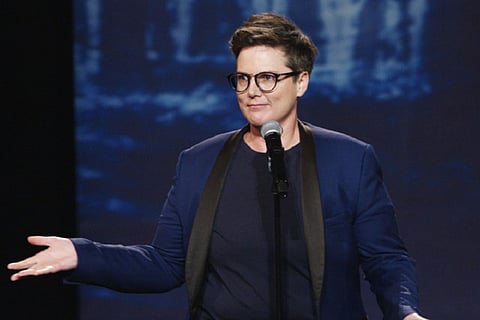

Hannah Gadsby's Netflix special Nanette is the kind of stand-up comedy that is rare to come by, with humour gleaming like a diamond and cutting just as hard.
It's also a show where the comedian tells you that she wants to quit comedy. And she isn't joking. Hannah goes on to establish just why, walking this unnerving tightrope of mixing intensely personal and traumatic experiences with a brave insight that makes us laugh and think all at the same time.
The stand-up comedian from Tasmania begins the routine speaking about her identity as a lesbian woman – coming out at a time and place where homophobia was in her face. She speaks of how the world around her reacted – with delightful narrations about her mother comparing her identity to that of a murderer's, her unwillingness to come out to her grandmother who wishes her a Mr Right just around the corner, she not being "lesbian enough” or "enthusiastic" enough about being lesbian.
But these jokes, which set up the routine and make the audience feel settled, go beyond the usual personal comedy that stand-up artistes use. Hannah picks up from where she let off later in the show, making us sit up and take notice of why she's rethinking doing comedy.
Her body language, light and easy, changes as the show progresses; her stance becomes more assertive, her face radiates pain. She even nearly cries on the show. But never for a moment does she go out of control, always bringing the audience back with a casually delivered line that offers comic relief.
Her deconstruction of the gendered world around us – which begins with asking why we put pink headbands on bald babies, and an argument for why blue should really be a feminine colour – takes plenty of potshots at the straight, white man. And why not? For it is the straight, white man who has been deciding what the standard should be for everything, including stand-up. Hannah notes that she's done with self-deprecating humour because when a person from a marginalised community laughs at herself, it is not humility but humiliation, and she doesn't want to be part of that any more.
Instead, Hannah uses her life experiences, including her degree in art history, and mental health issues, to punch upwards. I was reminded of Virginia Woolf's A Room of One's Own as I was laughing my head off at Hannah's take down of legendary artists and how they've painted women over the ages. In A Room of One's Own, Virginia Woolf, analyses how male writers have written women characters in a tone so deliciously funny and incisive, I was a changed person by the end of the book. I was only seventeen at the time but it had such a dramatic influence on the way I approached literature.
Hannah's descriptions of the paintings we've been taught to revere gave me the same sense of sudden insight – why did I not think of this myself? Now that she says it, how absurd that I've thought these representations of women are great, when they are so unlike any woman I know? Is it art only because a white man painted it and other white men told us it was?
Nanette is a textbook for those who want to write comedy, and Hannah is a bloody good teacher. She not only breaks down her own jokes, she also points out the problems with the joke as a medium. What should the role of the stand-up comedian be in a world where men like Trump are elected to power? Where sexual harassers like Woody Allen, Harvey Weinstein, Roman Polanski or Picasso are protected by their genius, while nobody gives a fig about their victims? On whom should the jokes be?
Some may feel Nanette isn't funny enough, that Hannah speechifies too much and doesn't deliver on the promise of humour. That as the show draws to a close, it resembles spoken word poetry more than a stand-up special. But this is a comedian who takes her job so seriously that she's invested in questioning the fundamentals of it, reinventing the platform that it offers her. Her punchline 'Hindsight is a gift, stop wasting my time' is something I will keep revisiting, like a good joke that never grows old.
Thank you, Hannah, for putting yourself under the spotlight, so the rest of us can find a way out from the darkness.